This blog delves into the fascinating world of blockchain technology. It explores the significance of blockchain, the hurdles encountered during its implementation, and the trailblazers leading the way in adopting this revolutionary technology. Additionally, this blog provides a comprehensive framework to assess whether your organization could benefit from harnessing the power of blockchain.
The Fundamentals of Blockchain
Blockchain has amassed a massive fan following in recent years, especially due to the popularity of Bitcoin, which is based on blockchain technology. However, there is also a lot of noise & hype associated with Blockchain. Some proclaim that it will revolutionize the internet and usher in a new phase of decentralization and others say that it is nothing more than unsubstantiated tall claims. In this article, we shall filter the noise and help you assess the question “Should you and your organization invest in blockchain?” and “is there a strategic business value in adopting blockchain?”
For beginners, we present a simple explanation of blockchain: “An ever-growing distributed digital ledger or database that keeps a permanent record of all transactions in a secure, chronological, and immutable manner. This is done by keeping sync over a network of computers where a copy of the ledger is maintained so that there is no single point of failure”. One can also look at it as a novel technology that has the potential to eliminate the requirement for a neutral third or centralized party to verify data and create trust since every piece of information is mathematically encrypted with built-in consensus protocols.
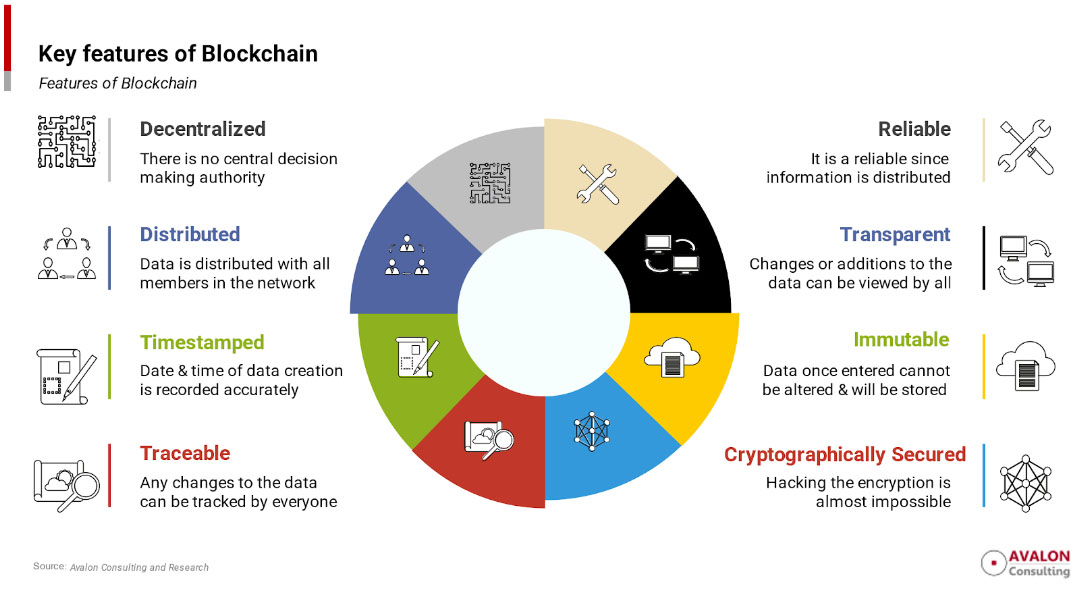
Is there a need for Blockchain?
One might wonder, do we need a technology such as Blockchain? Especially when everything seems to be working just fine with the rapid growth of Cloud computing, emerging AI & ML data management, and many more advances. Let us examine the emergence of blockchain to better understand why it is being developed:
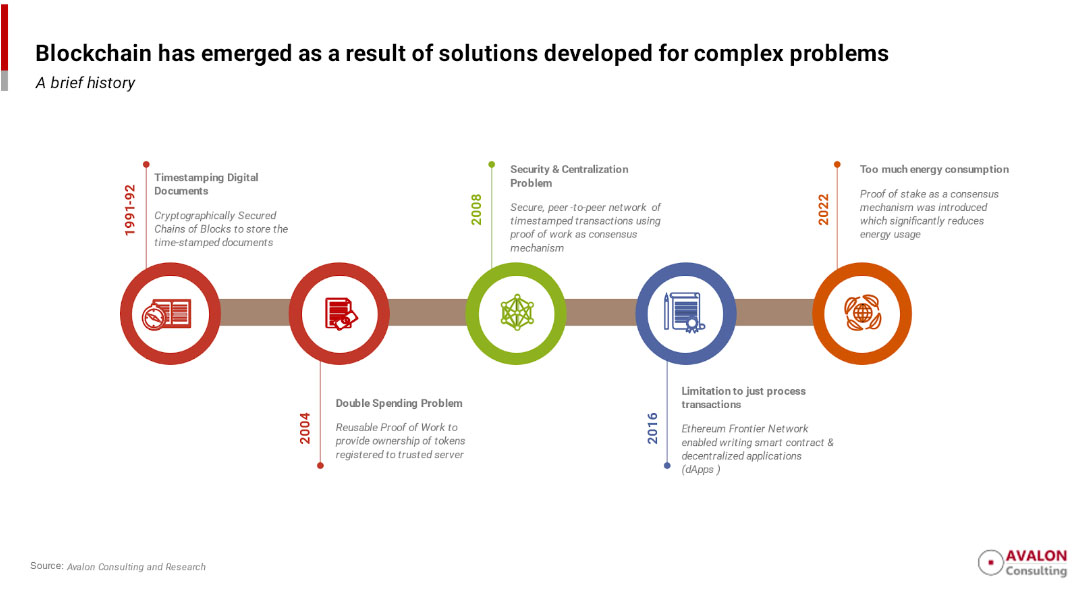
Blockchain For All
Before we proceed further, we must understand that despite blockchain’s relative complexity, it is not something exclusive to deep tech companies led by engineers & scientists with cutting-edge technology. It can very well be implemented for any business which generates and/or processes data and applications – thus any and every organization under this spectrum qualify for utilizing Blockchain in their business.
Blockchain can enable businesses to reap benefits including but not limited to a reduction in operation time, Data immutability, Enhanced security, Instant traceability, and Automation. Many businesses, from global supply chains to financial services and healthcare, across the globe, have already started investing in this technology to revolutionize their way of working.
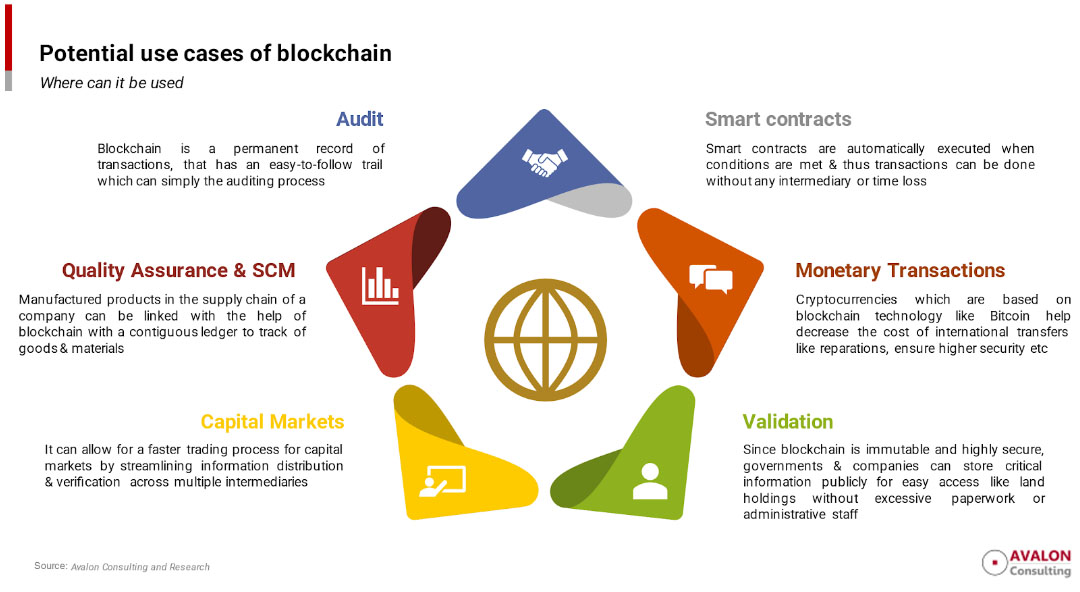
Multiple challenges remain but can they be resolved?
Despite an undeniable consensus that Blockchain can help, there are challenges in adopting & implementing this technology as it is with almost all new developments. To holistically understand blockchain as a solution, let us understand these challenges and their probable resolutions.
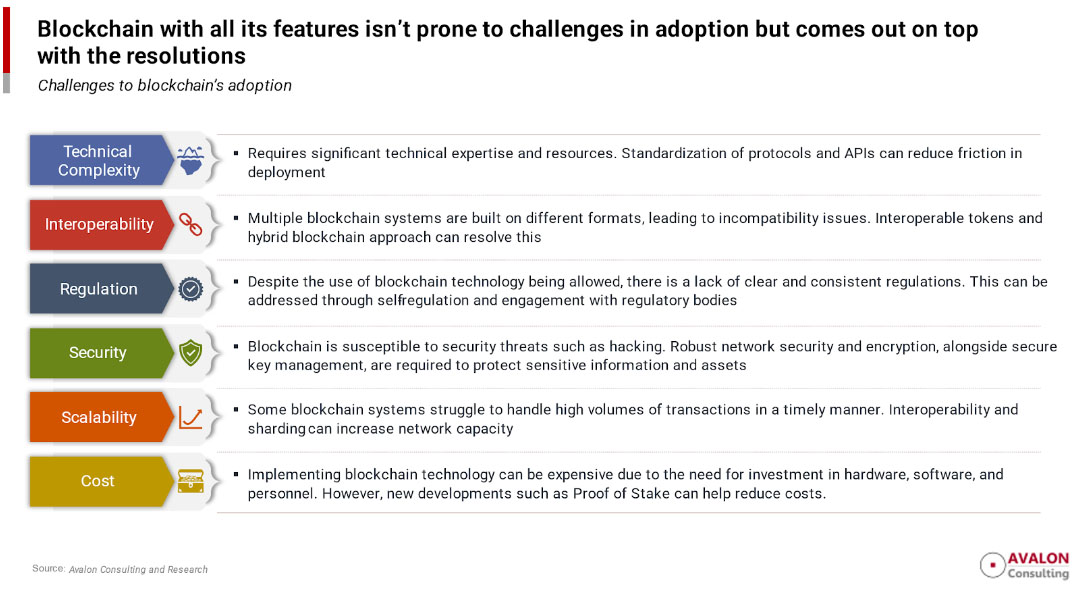
Success and Failure
Now that we have understood the challenges in the adoption of blockchain as a solution, and the inherent resolutions to each of these challenges, Let’s now examine some pioneers in the implementation of blockchain technology, both those who have had successful outcomes and those who have not.
BMW – tracking the manufacturing value chain
The BMW Group faced challenges in managing their globally distributed supplier network, including lack of data transparency and security. In 2018, they implemented a proof of concept using blockchain technology that improved supply chain data sharing and transparency among suppliers. The pilot project, known as Partchain, improved overstocking and shortages, provided detailed information on parts origin, and revealed cost and time-saving opportunities. The successful pilot was scaled up to include more suppliers, providing BMW with real-time visibility and traceability across their entire supply chain.
This real-time visibility available to all members of the supply chain led to several improvements such as:
- Prevented overstocking & shortages.
- Detailed information on the origin of parts
- Reveal improvement opportunities to decrease cost/time
Thus, with visible benefits from the pilot, the blockchain technology was soon scaled up to more suppliers and titled ‘Partchain’, enabling BMW to track data across their entire supply chain.
Ripple – simplifying cross border banking transactions
SWIFT is a secure messaging system that financial organizations use for cross-border transactions across the world. It has more than 8,000 institutions from over 200 countries and acts as an intermediary for banking, brokerage, and stock transactions.
Although SWIFT has been lauded for making international money transfer simpler and friction-free as against the older system, it faces some major issues.
- Slow transaction processing – can take up to 5 working days
- Higher fees due to multiple banks involved in transactions
- Currency exchange fees added to the total cost
- Possibility of fraud in which the guidelines are not followed as exemplified by the PNB Scam
- Requires reliable IT infrastructure from both sides.
To counter these problems that SWIFT faces, Ripple came up with a blockchain-based technology that can process transactions globally in all currencies. It was created for banks & financial institutions and is a P2P decentralized platform that allows for the transfer of money in any form – whether fiat or cryptocurrencies. It can also be termed as a ‘digital hawala network’ and the costs are very low since it is done directly on the ripple network.
The Ripple network does not run with a bitcoin-like proof-of-work (PoW) system lor even proof-of-stake (PoS) system. Instead, a consensus protocol is used to validate transactions & validate account balances and it is much faster than the SWIFT system. Major banks such as IndusInd Bank, Santander, and Bank of America utilize Ripple to process cross-border payments & transactions in a faster and cheaper way.
Estonia – the Digital Republic
Governments have always faced challenges in managing administrative capabilities and handling massive troves of sensitive data of their people. However, Estonia has always had a highly developed digital infrastructure for providing all kinds of government services – citizens have been able to vote online since 2005, it takes them 5 minutes to file their income tax, and doctors can view collated patient records securely.
To allow secure data sharing between public and private organizations, Estonia had developed X-Road, a data exchange system, where the information is kept private through cryptography. However, the Estonian institutions faced a massive cyberattack in 2007– thus exposing the vulnerability of centralized data. To avoid such a scenario from repeating, they moved to the distributed ledger based on Blockchain in 2012 which nullifies any cyberattacks.
There are 3 aspects to Estonia’s technology: e-ID, X-Road, and KSI Blockchain. E-ID is the digital identity of the citizens where their data is stored. Even though there might be fear of data hacking by the government, it is owned by the citizens & they can allow which part of their data to be made available. X-Road is the exchange medium that allows connectivity & data sharing between institutions. Finally, KSI Blockchain (also used by NATO & US DoD) ensures the security of the system – the data never leaves the system & no data is stored in the blockchain.
This move by Estonia of providing digital service through blockchain is helping them save an estimated 2% of their GDP, provides immutability of the data (e.g. property registry), allows transparency of government services, security from cyber hacking, and saves time since it is faster, among other benefits.
TradeLens – Challenge of scale
TradeLens was a blockchain-based platform aimed at digitizing and improving the shipping industry’s processes and interconnectivity between multiple stakeholders such as shippers, ports, customs brokers, and more. It was sponsored by Maersk and IBM and had processed over 70 million containers and was connected to 40 ports worldwide. Despite its potential benefits, TradeLens faced several challenges and was eventually shut down in 2023. Some of the reasons for its failure were the lack of trust among participants, insufficient revenue, insufficient research into the root causes of inefficiencies, and a perceived lack of neutrality due to the network being sponsored by Maersk. These challenges highlight the importance of considering all potential obstacles before implementing a blockchain solution, especially in complex industries like global trade.
Key takeaways from the failure of TradeLens include:
- The need for a clear understanding of the root causes of inefficiencies and how blockchain can address them
- Ensuring sufficient revenue generation and buy-in from all participants
- Building trust among all stakeholders and avoiding a perceived lack of neutrality
- Thoroughly researching the feasibility of blockchain implementation and considering all potential obstacles
Should you employ Blockchain?
Now, after understanding the background of blockchain and the variety of use cases where blockchain has helped change how businesses’ function, let us weigh in on the primary question– should you invest in blockchain?
After having done a careful study of various case studies and real-world applications of blockchain, we have arrived at a structured approach that can be utilized by organizations to make an informed decision. The simple decision tree shall guide your thinking toward the answer: should you adopt blockchain to turbocharge growth in your company/solve specific problems that you have been facing or should you skip it and instead continue with your existing infrastructure?
Simply follow the decision tree below and choose your answer based on your problem/solution requirement and arrive at the final level. It is important to note that ‘not taking an action’ is still an action since in some cases there is no viable benefit of blockchain adoption and look at an alternative or sticking with the existing format is the best choice.
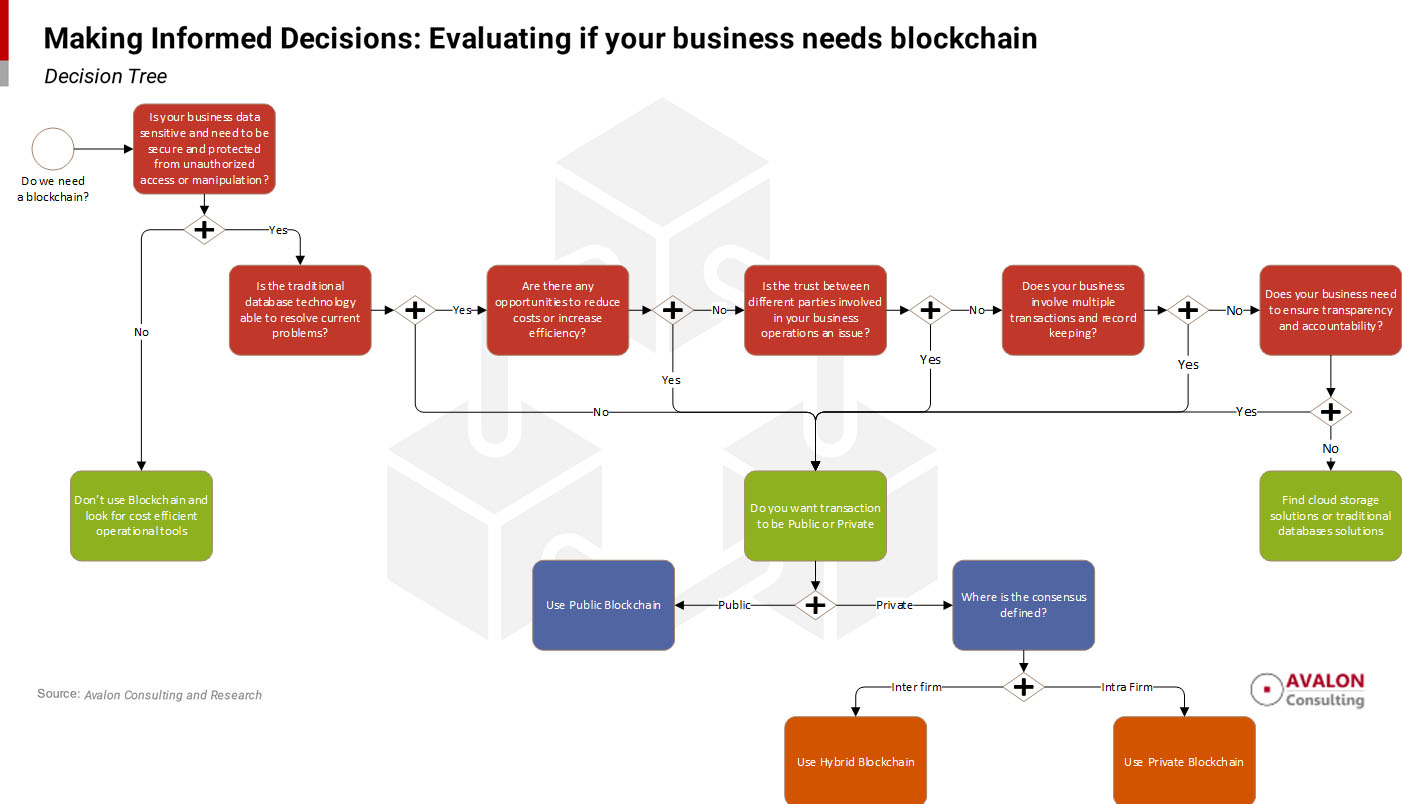
Once you have determined if blockchain is a viable solution for your business’s problem, it’s important to consider the challenges associated with the technology to ensure success. By factoring in these challenges mentioned previously and taking a leaf from the successful as well as failure cases during implementation, you can safeguard the success of adopting Blockchain.
Everyone can leverage blockchain in a meaningful way
Blockchain is a technology that has revolutionized the business world. It has become a critical tool for organizations looking to drive digital transformation and improve transparency, security, and efficiency in their operations. The features of blockchain such as immutability, decentralization, and smart contracts, have opened up new avenues for businesses to explore, and it has shown promising results in verticals such as finance, supply chain management, and auditing.
However, the complexity of blockchain and its high associated costs have been a hindrance for some organizations. It is important to understand that blockchain is not a one-size-fits-all solution and to determine if it is well-suited for your business, our well-structured approach can assist you to explore the relevance of blockchain and to determine if it is the right fit for your business. By considering the unique characteristics and requirements of your business, you can harness the full potential of blockchain and unlock new opportunities in the market.
In conclusion, blockchain has immense potential for organizations looking to drive transformation, and the future of this technology looks bright. The time to act is now, and organizations that take the lead in adopting blockchain will have a competitive edge in the market.











